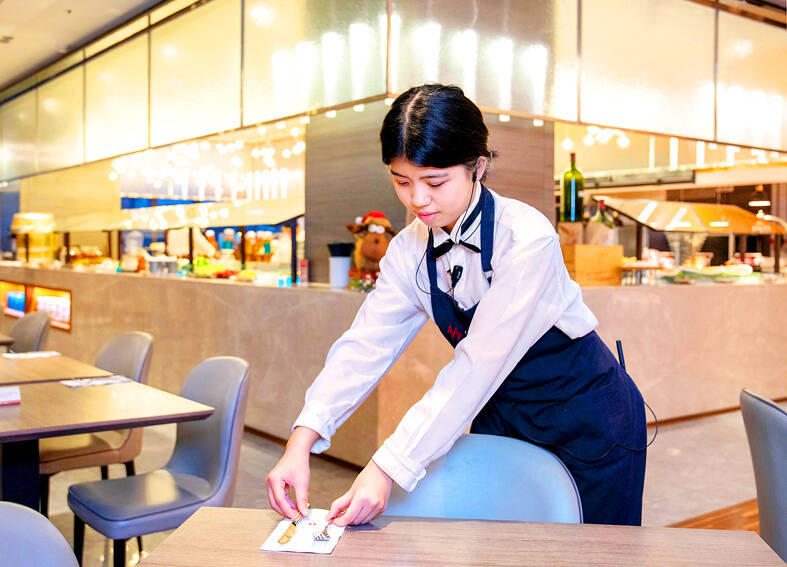An ongoing labor shortage in hotels and restaurants is due to low wages rather than imbalanced supply and demand, the Ministry of Labor said yesterday.
The ministry made the remarks after Grand Hyatt Taipei (台北君悅大飯店) general manager Will Chen (陳慶隆) on Wednesday told reporters that the five-star facility is looking at a rapid recovery in business next year.
However, the lack of staff is slowing the pace, he said.

Photo courtesy of Caesar Park Hotels and Resorts
Formosa International Hotels Group (晶華酒店集團) chairman Steve Pan (潘思亮) earlier said its flagship property, the Regent Taipei (台北晶華酒店), had to turn down reservations for thousands of banquet tables due to understaffing.
About 58 hotels have about 380 vacant positions, but only 37.4 percent meet wage expectations, the ministry said, adding that there is ample room for improvement if companies want to resolve the situation.
The ministry said it had launched rounds of matching campaigns, and concluded that wage expectation gaps account for the understaffing issues in the hospitality sector.
Hotels have pressed the government to ease regulations regarding hiring migrant workers, as it is currently limited to the manufacturing, construction, agriculture and fishing sectors, as well as caretaker positions.
The service sector comprises 60 percent of employment in Taiwan, and there are many potential workers available locally to work at hotels and restaurants, the ministry said.
Hospitality operators should lower their qualification requirements or raise compensation to attract applicants to vacancies, it said.
Dependence on low-paid migrant workers is not healthy for the industry or society, it added.

South Korea’s equity benchmark yesterday crossed a new milestone just a month after surpassing the once-unthinkable 5,000 mark as surging global memory demand powers the country’s biggest chipmakers. The KOSPI advanced as much as 2.6 percent to a record 6,123, with Samsung Electronics Co and SK Hynix Inc each gaining more than 2 percent. With the benchmark now up 45 percent this year, South Korea’s stock market capitalization has also moved past France’s, following last month’s overtaking of Germany’s. Long overlooked by foreign funds, despite being undervalued, South Korean stocks have now emerged as clear winners in the global market. The so-called “artificial intelligence

NEW IDENTITY: Known for its software, India has expanded into hardware, with its semiconductor industry growing from US$38bn in 2023 to US$45bn to US$50bn India on Saturday inaugurated its first semiconductor assembly and test facility, a milestone in the government’s push to reduce dependence on foreign chipmakers and stake a claim in a sector dominated by China. Indian Prime Minister Narendra Modi opened US firm Micron Technology Inc’s semiconductor assembly, test and packaging unit in his home state of Gujarat, hailing the “dawn of a new era” for India’s technology ambitions. “When young Indians look back in the future, they will see this decade as the turning point in our tech future,” Modi told the event, which was broadcast on his YouTube channel. The plant would convert

‘SEISMIC SHIFT’: The researcher forecast there would be about 1.1 billion mobile shipments this year, down from 1.26 billion the prior year and erasing years of gains The global smartphone market is expected to contract 12.9 percent this year due to the unprecedented memorychip shortage, marking “a crisis like no other,” researcher International Data Corp (IDC) said. The new forecast, a dramatic revision down from earlier estimates, gives the latest accounting of the ongoing memory crunch that is affecting every corner of the electronics industry. The demand for advanced memory to power artificial intelligence (AI) tasks has drained global supply until well into next year and jeopardizes the business model of many smartphone makers. IDC forecast about 1.1 billion mobile shipments this year, down from 1.26 billion the prior

People stand in a Pokemon store in Tokyo on Thursday. One of the world highest-grossing franchises is celebrated its 30th anniversary yesterday.